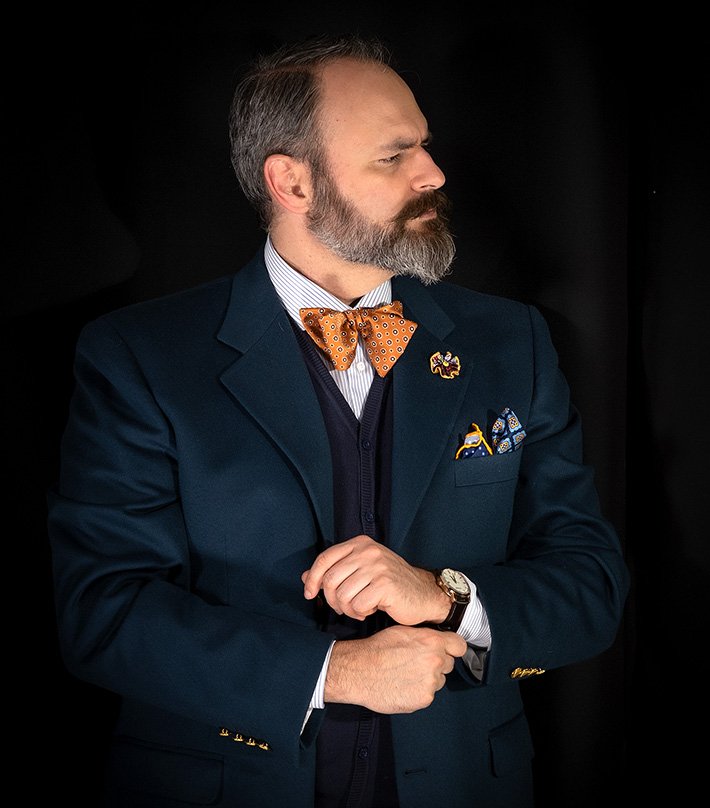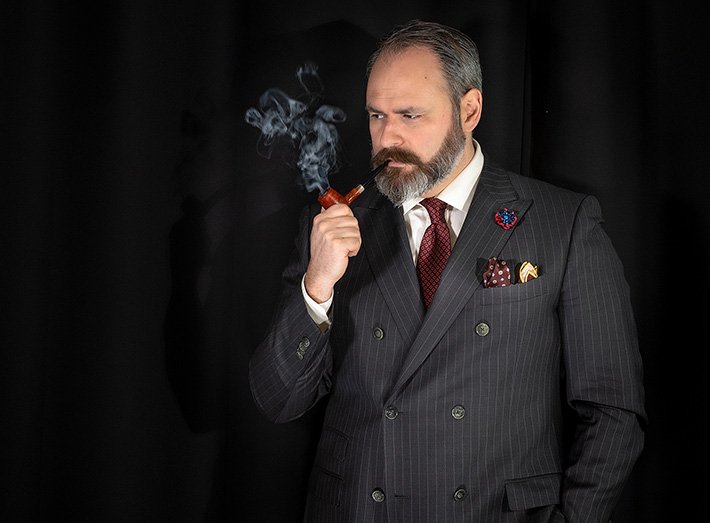Douglas Mortimer, is not only the famous "gentleman gunman" created by Sergio Leone in his Dollar Trilogy, but is also the stage name with which Fabio Bernieri identifies and carries on his peaceful battle for knowledge and spreading the culture of elegant living in Italy.
A character of the past, romantic and a dreamer, who still believes in the importance of kindness over vulgarity, of cavalry over rudeness and elegance over carelessness.

How would you define your style?
Although my style has changed and matured over time, from the beginning it has always orbited around those canons of dress, which developed and consolidated around the ‘30s of the last century, which today constitute the foundation of classic masculine elegance.
My style can therefore be defined as classic. Among the various declinations of classic dress, I particularly love the informal, rural look, which I prefer using in my private life, rather than in public or on my social media accounts.
What do accessories represent for you and what are your favorites?
Accessories are what make your style alive, thus giving life and personality to it. Without accessories, one's outfit would be a mere wrapping, sterile and inert, devoid of quality and originality. However daring the comparison, we could go so far as to argue that accessories are for one's own look, what the soul is for one's own body.
Quality, finesse, originality are therefore fundamental characteristics of the accessories. They are what distinguishes us, what values us and that makes us "unique". Among the many accessories provided by classical elegance, my favorite obviously remains the tie which, in all its infinite variations, is able to accompany and give personality to any outfit, from the most formal to the most casual and informal.
Which tie knot do you prefer?
The knot of the tie is something that has to be chosen only on the basis of the collar of the shirt that will host it. A wedding must be born between tie and collar, and the choice of the knot determines the success of this partnership.
In general, my favorite knot is the simple knot (what the Anglo-Saxons call four in hand). Not so much for its simplicity of realization, as for its sobriety and above all - it may seem paradoxical - for its innate imperfection. In fact, elegance, in my view, as far as it must strive for perfection, must never reach it. Elegance is not perfection. Elegance is impalpable imperfection.
What is your favorite motif in a tie?
In principle, preferring sobriety, I love simple and inconspicuous motifs. I therefore prefer small geometries, the bold texture of a solid color or the severity of a regimental motif. Yet, despite my preference for minimalism, I sometimes feel the desire to wear an exuberant paisley which, certainly more than the others, manages to express its flair and originality.

Who or what is the main source of inspiration for your style?
As I anticipated in part by answering the first question, my points of reference remain the canons of classic elegance. In this regard, the depictions of the fashion magazines of the time have been and still are of great inspiration, the so-called "figures", illustrated by famous artists such as Laurence Fellows or Joseph Christian Leyendecker. Important inspirational sources were also the advertising posters, which at the time were commissioned to internationally renowned illustrators, among which I remember the Triestine Marcello Dudovich and the most recent René Gruau.
What style advice can you offer?
In order to be able to build your own style, I believe it is necessary to start from that fascinating and articulated world of tacit rules that underline male elegance. Only by knowing the rules, you can play to break them with awareness and respect.
What is the element that a man must not give up to be elegant?
There are two elements that a man cannot give up to be elegant. The first is an intangible but essential element: respect for the context and for the rules. Only by respecting the context and the hidden rules imposed by the occasion can a man aspire to be elegant. But that's not enough.
There is another element at the basis of elegance, perhaps even more essential and intangible than the previous one: personality. More than any other element, personality is something that cannot be purchased and cannot be read on books: it is sensitivity, it is naturalness, it is knowing how to choose a tie, it is spontaneity, it is what makes us unique.
When not at work, how do you like to relax?
Outside of work I am very reserved. I love being away from the crowds and big cities. Whenever I can I go for a walk in the woods in search of my beloved mushrooms or in the country meadows to collect wild herbs. When I travel for pleasure, I prefer to visit the small villages of which our country is rich or, if I happen to visit some large capital, I prefer to get lost in the narrow streets of its historic center rather than among the windows of large-scale retail outlets.


